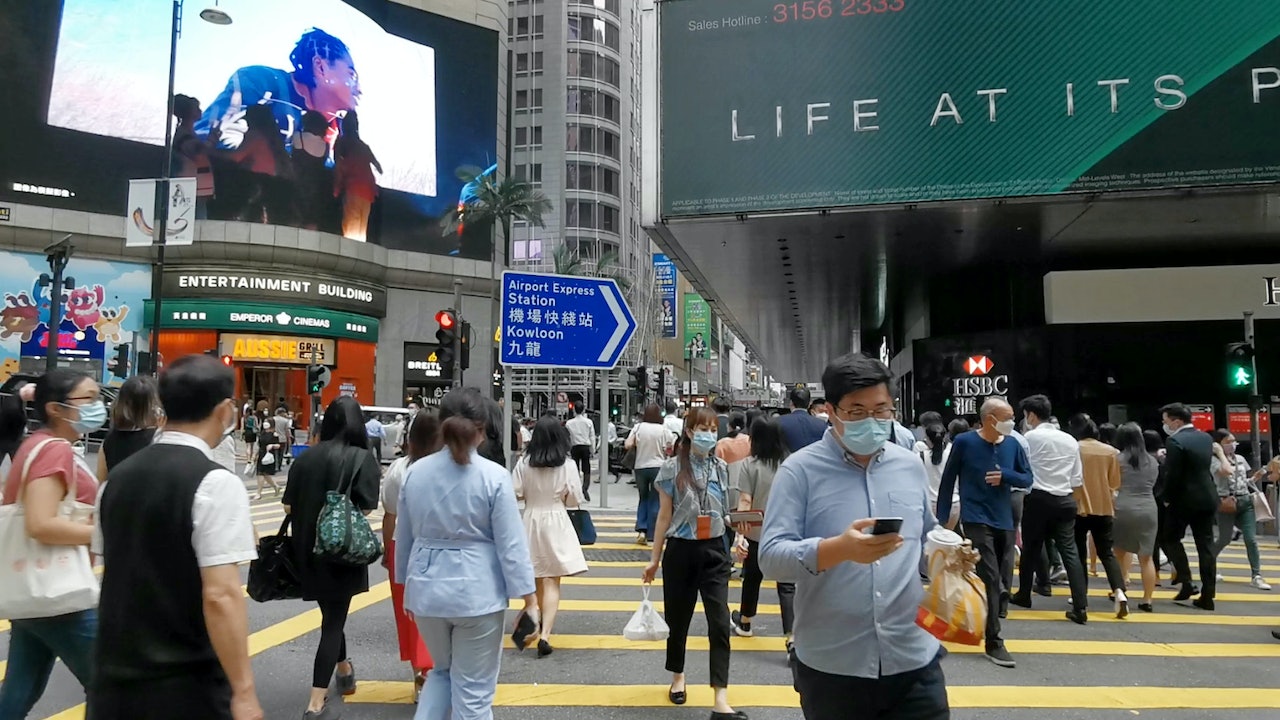Xi Jinping, General Secretary of the Communist Party of China, mentioned in the "20th National Congress Report": "Support Hong Kong and Macau to develop the economy, improve people's livelihood, and solve the deep-seated contradictions and problems in economic and social development." What is said, but the words are different, there is no unified statement.
"Hong Kong 01" raised two questions to the Chief Executive's Office, various policy bureaux and members of the Legislative Council on the content of Xi Jinping's speech above, namely, how to understand the "deep-seated contradictions" in Hong Kong and how to counteract them.
Neither the Chief Executive's Office nor the Policy Bureau responded, and Members' responses came from various angles, indicating that the political community has different understandings of this issue. There are four main categories. The following Members focus on the structural imbalance in resource allocation.
Tian Beichen.
(file picture)
Excessive prosperity in real estate allows a small number of people to accumulate a lot of wealth without being productive, while most people rely only on labor income, but it is also difficult to live comfortably.
Legislative Council Member Tian Beichen
Tian Beichen: A large number of resources are concentrated in the hands of a few industries and individuals
Tian Beichen believes that the deep-seated contradictions in Hong Kong stem from the successful development of Hong Kong into a financial and real estate city before the handover. A large number of assets are concentrated in the hands of a few industries or even a few people. These groups or individuals in turn exert great influence and continue to maintain their advantages in the political and economic aspects. Create a stable vicious cycle structure.
He said that the excessive prosperity of real estate has caused a small number of people to accumulate a lot of wealth without being productive, while most people only rely on labor income, but it is also difficult to live comfortably.
The side effects of booming real estate, such as rising rents and higher living costs, are mostly borne by the people.
Tian Beichen said that the first solution is to build a large amount of land to prevent the crazy rise in property prices, the second is to develop diversified industries to provide room for development, and the third is to adopt a more just tax and progressive tax rate in the tax system reform.
Di Zhiyuan.
(Photo by Zhang Haowei)
Di Zhiyuan: Unreasonable allocation of social resources should actively deal with aging
Di Zhiyuan pointed out three points. First, the distribution of social resources is unreasonable, the disparity between the rich and the poor continues to widen, and the grassroots citizens fail to share the fruits of economic development.
Second, the relationship between the government and the society is not good, the people's hearts are not stable, and the people still have distrust and dissatisfaction with the government.
Third, the development of democracy has not yet achieved the goal.
Di Zhiyuan believes that in order to solve the problem of the disparity between the rich and the poor, it is necessary to target poverty alleviation, actively respond to the aging population, and improve elderly care services.
In order to improve the relationship between citizens and society, more communication is needed, public opinion should be used as the basis for governance, and more diverse participation is needed.
In addition, Di Zhiyuan pointed out that the government should create favorable conditions for the implementation of dual universal suffrage, and the district councils should also maintain democratic elections to strengthen the participation of young people in social affairs.
Lin Zhensheng.
(file picture)
Lin Zhensheng: Citizens who do not benefit from economic development must intervene more vigorously in the market
Lin Zhensheng focused on the economic and social problems caused by the "big market, small government" and "active non-intervention policy" pursued by the previous government. He pointed out that with the economic development, the industry is still monolithic and the distribution of resources is uneven, which has caused the market to become unbalanced and polarized. Vulnerable citizens who lack bargaining power cannot benefit from economic growth, and have accumulated conflicts in various areas, including housing, labor, education and social welfare, etc. As a result, young people cannot rise up through the development of a diverse society, and property prices have soared It makes it difficult for ordinary citizens to work hard to get their own home.
Financial Secretary Paul Chan said that the government's development philosophy is no longer "big market, small government" and "active non-intervention", but a combination of "promising government" and "efficient market".
Lin Zhensheng agreed that the government should intervene more in the market. In addition to land and housing, it must also focus on promoting advantageous industries, drastically reform vocational education, promote industrial advantages and improve labor rights, etc., so as to narrow the gap between the rich and the poor, the strong and the weak.
Lin Zhensheng pointed out that in the past, it has relied on the four major industries of financial services, tourism, trade and logistics, and professional and industrial and commercial support services. He believes that the government cannot allow the industry to solidify. There are more options for youth.
As for the labor-management conflict, Lam Chun-sing pointed out that it is not an enemy or an enemy, but the bargaining power of low-skilled workers is low. He suggested that the Labour Department should set up a tripartite group in various industries to strengthen the participation of both employers and employees to increase the recognition and let the group play a more important coordinating role.
Chen Peiliang.
(Screenshot of the video of the Hong Kong Restart Major League)
Chen Peiliang: Unbalanced distribution of political and economic interests focuses on solving housing problems
Chen Peiliang believes that the "deep-seated contradictions" are both old and new. Overall, they are the result of years of unbalanced distribution of political and economic benefits, making it difficult for citizens to live comfortably, unable to support their old age, the gap between the rich and the poor, public healthcare, and lack of social security. , social class differentiation, solidification.
Chen Peiliang focused on the land dilemma. He pointed out that the "Policy Address" focused on housing issues and proposed a number of ways to speed up the supply. This shows that the government is confident in solving the "housing" problem.
Guan Haoming.
(File photo/Photo by Lu Yiming)
Guan Haoming: Stakeholders do not compromise with each other, leading to difficulties and need to make concessions and develop together
Guan Haoming pointed out that each conflicting stakeholder carries its own best interests, does not make concessions and compromises with each other, and often only strives for the right to speak for themselves, so it is impossible to solve the "deep contradictions".
Taking the development of the border land of Tai Lam Country Park as an example, he pointed out that the government initially believed that the ecological value was low and could study the development of 35,000 housing units. However, some environmental groups believed that the nearby brownfield should be recovered before the development of the border land of the country park.
Guan Haoming believes that environment and development are not opposites. Considering that more than 200,000 people still live in subdivided housing, all stakeholders should work together to find a way to solve the predicament.
Guan Haoming, who emphasized the incompatibility of social stakeholders, believes that all stakeholders should take into account the overall development of the country and the overall interests of Hong Kong, and make concerted efforts to "give in" more from the compromise, so that those sent out in the development of the society should work together. The "bonus" is more generous.
Jiang Yuhuan.
(File photo/Photo by Zhang Haowei)
Jiang Yuhuan: The government needs to promote the self-renovation of the social structure
Jiang Yuhuan put forward two aspects: one is the inevitable structural contradiction in the development of capitalist society to a certain stage, which means that after capitalist society has developed to a certain extent, the driving force for continued development gradually diminishes, and it gradually loses the satisfaction that most people in society have for higher levels. ability to meet the needs of life.
At the same time, the government also lacks a certain sense of self-innovation and control over the economy and capital. For a long time, it is self-contained, lacking a clear self-awareness and system and technological innovation that keep pace with the times. Social contradictions will gradually become prominent, and the direct result It is the living dilemma that citizens are facing, such as housing problems, food and clothing problems, and employment problems.
On the other hand, Jiang Yuhuan pointed out that 25 years after the return of Hong Kong, the "return of people's hearts" is still insufficient, resulting in the public's lack of understanding of the country's development, the cognitive bias of the "one country, two systems" policy, and even some social resistance to the mainland.
Jiang Yuhuan believes that the SAR government should lower its stance, examine the deep-seated problems of Hong Kong society, dare to promote the self-renovation of Hong Kong's social structure, actively adopt policies to promote social equity, alleviate the polarization between the rich and the poor and the capital-led situation, and truly walk out of the economic and social development. The "Hong Kong Model" grasps the advantages of Hong Kong and realizes the progressive significance of "One Country, Two Systems".
Chen Yingxin.
(File photo/Photo by Ou Jiale)
Chen Yingxin: Create a fair and just environment by allocating resources
Chen Yingxin also pointed out that the uneven distribution of social resources is a "deep contradiction" that has plagued Hong Kong for many years.
The core issues such as the disparity between the rich and the poor, the lack of upper-class opportunities for young people, and housing difficulties reflect that many citizens have not been able to enjoy the fruits of Hong Kong's economic development in the past, which not only hinders social development, but also exacerbates conflicts.
Chen Yingxin believes that in order to have a fairer and more just environment, we must start with the redistribution of resources. The government must increase its efforts to solve core problems through a multi-pronged approach, play a balancing role, and promote fairness and justice in resource distribution and income distribution.
For example, she gave an example. First of all, to implement poverty alleviation policies, increase the supply of public housing, plan for the development of youth, and comprehensively address the problem of intergenerational poverty, so that the new generation of young people have the opportunity to move upward, so as to truly improve the quality of life of grassroots families.
Topic ︱Deep-level contradictions Speaker Renshu's interpretation of the topic from four directions Contradictions focus on enhancing a sense of belonging, upward flow, housing and land








